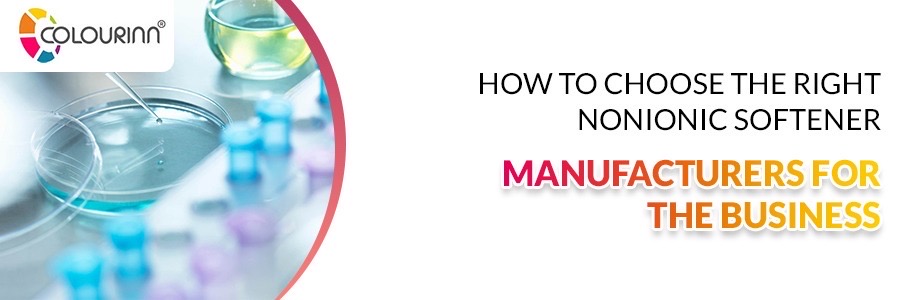Selecting a nonionic softener manufacturer is a pivotal decision for any textile business aiming to enhance the quality and feel of its products. The right partnership can lead to significant advancements in product quality, operational efficiency, and market competitiveness. This guide outlines five essential steps to identify and collaborate with the ideal nonionic softener suppliers, ensuring your business’s needs are met with professionalism and precision.
1: Key Factors to Consider When Selecting a Nonionic Softener Manufacturer
Choosing the right nonionic softener manufacturer for your business involves more than a cursory glance at product catalogues. It requires a deep dive into several critical factors that can significantly impact your operations and product quality. Here are some essential considerations:
- Experience and Reputation: The manufacturer’s industry standing speaks volumes. Look for companies with a solid track record, known for their reliability and product excellence.
- Compliance with Standards: Ensure the manufacturer adheres to international quality and safety standards. This compliance is not just about meeting regulatory requirements but also about ensuring the safety and satisfaction of your end users.
- Supply Chain Reliability:Assess the manufacturer’s logistics capabilities and their strategies for managing supply chain disruptions.
- Customization Capabilities: Your needs are unique. A manufacturer willing to customise formulations or packaging can be a valuable partner in meeting specific product requirements or branding objectives.
2: How to Assess the Quality of Nonionic Softeners
What truly sets apart high-quality nonionic softeners from the rest? Understanding this can help you make informed decisions when partnering with a nonionic softener supplier. Consider the following approaches to assess quality:
- Request Samples: Testing the product firsthand can provide insights into its efficacy and compatibility with your textiles.
- Technical Specifications: Review detailed product specifications, including chemical composition, pH value, and compatibility with various fabric types. This information can help you gauge whether the softener meets your needs.
- Customer Feedback: Existing customer reviews can reveal much about product performance and the manufacturer’s reliability. Pay attention to feedback related to product consistency and the manufacturer’s responsiveness to issues.
3: The Strategic Advantage of Local Versus Global Suppliers
When sourcing nonionic softener manufacturers in India, one critical decision is choosing between local and global suppliers. Each option presents unique advantages that can align with different business strategies.
- Local Suppliers: Opting for a local manufacturer can offer benefits like lower shipping costs, easier communication, and quicker response times to orders or issues. There’s also the advantage of supporting the local economy and possibly having more leverage in negotiating terms.
- Global Suppliers: On the other hand, global suppliers might provide access to more advanced technologies or specialised products not available locally. They can also offer competitive pricing due to larger scale operations.
4: The Impact of Sustainability on Your Choice
In today’s eco-conscious market, the environmental impact of the products you choose cannot be overstated. When selecting a nonionic softener manufacturer, it’s essential to consider their commitment to sustainability. Here’s how:
- Eco-friendly Practices: Look for manufacturers who prioritise reducing water usage, energy consumption, and chemical waste in their production processes. This commitment can significantly lessen the environmental footprint of your products.
- Sustainable Sourcing: Manufacturers who source raw materials responsibly ensure that their practices do not harm the planet or communities. This approach can align with your brand’s values and appeal to environmentally conscious consumers.
- Certifications: Certifications from recognized environmental organisations can serve as a testament to the manufacturer’s dedication to sustainability. These credentials can add value to your products in the eyes of your customers.
5: Navigating Cost Without Compromising Quality
Finding the right balance between cost and quality is a perennial challenge in sourcing materials. When it comes to nonionic softener suppliers, here are strategies to ensure you don’t compromise on quality for the sake of cost:
- Volume Discounts: Negotiating prices based on volume can lead to significant savings without affecting the quality of the softeners you purchase.
- Long-term Partnerships: Building a long-term relationship with your supplier can have mutual benefits, including better pricing, priority service, and access to the latest products and innovations.
- Total Cost of Ownership: Consider not just the purchase price but also the long-term costs associated with the product, such as efficiency, wastage, and the potential for customer satisfaction or returns. A slightly higher upfront cost might offer better value over time.
Conclusion: The Colourinn Advantage
When choosing a nonionic softener manufacturer, it’s essential to partner with a company that not only understands the technical aspects of textile auxiliaries but also shares your commitment to quality, innovation, and sustainability.
Colourinn stands out as a leader in the textile auxiliary industry, offering a wide range of high-quality textile dyes and auxiliaries that cater to a diverse array of needs.
With Colourinn, businesses gain access to a wealth of expertise in molecular research, ensuring products are at the forefront of technological and environmental standards.
The company’s dedication to quality assurance, combined with a professional team and robust infrastructure, makes Colourinn an ideal partner for businesses seeking to elevate their textile products.
Embracing Colourinn‘s offerings means not just acquiring superior nonionic softeners but also joining a partnership that values excellence, innovation, and customer satisfaction above all.
Frequently Asked Questions
Q1. What is a nonionic softener?
A. Nonionic softener is an electrically charge-free fabric softening chemical, it is perfect for adding softness to fabrics without interfering with their electrostatic qualities. Clothes have an opulent sense after use, feeling smooth and cozy.
Q2. How does nonionic softener differ from other fabric softeners?
A. Nonionic softeners are appropriate for a larger variety of fabrics since they do not have a positive or negative charge, in contrast to cationic or anionic softeners.
Q3. Is nonionic softener safe for sensitive skin?
A. In general, nonionic softeners are regarded as safe for use on delicate skin types. But it’s best to examine a tiny, discrete portion of the material or clothing first, particularly if you are aware of any skin sensitivities.

